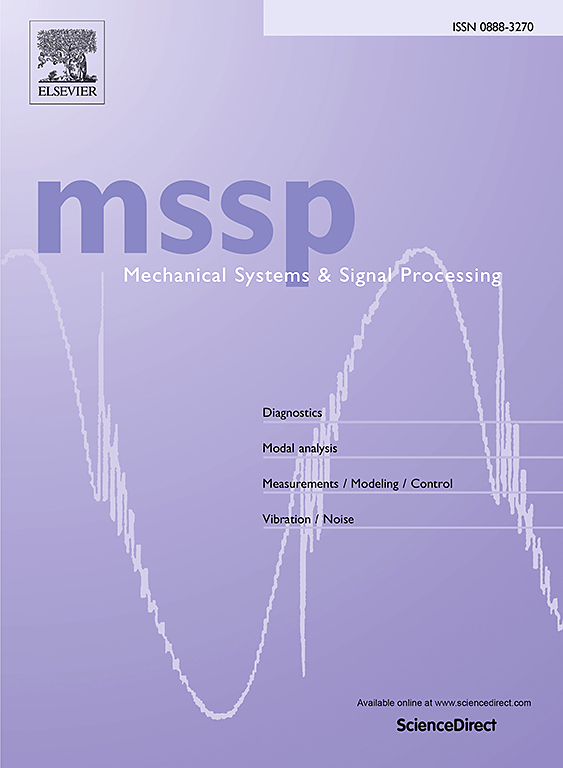基于参考周期相似度的重加权奇异值分解信号去噪方案及其在工业旋转机械弱故障特征诊断中的应用
IF 8.9
1区 工程技术
Q1 ENGINEERING, MECHANICAL
引用次数: 0
摘要
近年来,重加权奇异值分解(RSVD)在旋转机械信号去噪和故障特征诊断中得到了有效的应用。与传统基于能量的奇异分量去噪方法通常保留奇异值较高的奇异分量(SCs)不同,RSVD利用周期调制强度(PMI)和基尼指数(Gini)等多种指标选择性地提取包含更丰富故障相关信息的SCs。然而,在一些弱故障特征场景下,基于pmi的RSVD和基于gini的RSVD效果不佳。为了克服这一问题,提出了一种基于参考周期相似度(RPS)的RSVD方案,该方案利用故障周期T作为先验知识,用于信号去噪和弱特征诊断。引入了一种新的指标,即RPS,通过评估与预定义参考信号的周期相似度来选择最合适的sc。利用RPS,非故障相关信号分量的干扰影响较小,仍然可以选择故障特征非常弱的sc进行信号重构。仿真分析和实际实验信号验证了基于rps的RSVD的优点。结果表明,即使在故障特征很弱的情况下,该方法也具有较好的信号去噪效果。本文章由计算机程序翻译,如有差异,请以英文原文为准。
Reference-periodic-similarity based reweighted singular value decomposition signal denoising scheme and its application for weak fault feature diagnosis in industrial rotating machinery
Reweighted singular value decomposition (RSVD) has demonstrated its effectiveness for signal denoising and fault feature diagnosis for rotating machinery in recent years. Different from traditional energy-based SVD denoising approaches which usually retain singular components (SCs) with higher singular values, RSVD leverages various indicators such as periodic modulation intensity (PMI) and Gini index (Gini) to selectively pick SCs that contain richer fault-related information. However, it is shown that PMI-based RSVD and Gini-based RSVD are not as effective in some weak fault feature scenarios. To overcome this issue, a reference-periodic-similarity (RPS) based RSVD scheme, which leverages fault period T as prior knowledge, is proposed for signal denoising and weak feature diagnosis. A new indicator, namely RPS, is introduced to select the most suitable SCs by evaluating the periodic similarity with a pre-defined reference signal. Using RPS, interferences from non-fault related signal components become less influential and SCs with very weak fault signature can still be selected for signal reconstruction. The advantages of RPS-based RSVD are verified by both simulated analysis and real experimental signals. The results show that the proposed method is powerful in signal denoising even when fault features are very weak.
求助全文
通过发布文献求助,成功后即可免费获取论文全文。
去求助
来源期刊

Mechanical Systems and Signal Processing
工程技术-工程:机械
CiteScore
14.80
自引率
13.10%
发文量
1183
审稿时长
5.4 months
期刊介绍:
Journal Name: Mechanical Systems and Signal Processing (MSSP)
Interdisciplinary Focus:
Mechanical, Aerospace, and Civil Engineering
Purpose:Reporting scientific advancements of the highest quality
Arising from new techniques in sensing, instrumentation, signal processing, modelling, and control of dynamic systems
 求助内容:
求助内容: 应助结果提醒方式:
应助结果提醒方式:


